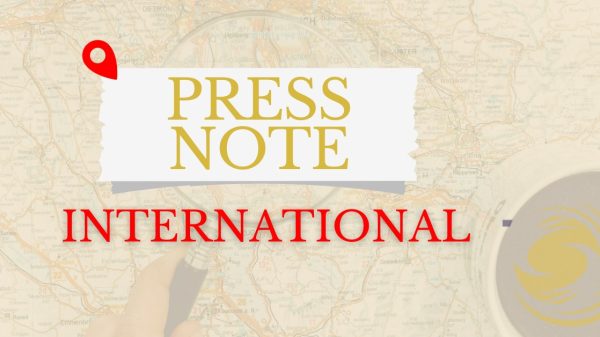Erdogan: Israel is the Biggest Obstacle to Middle East Peace

Iran FM Warns US Involvement in Conflict Would Be ‘Very Dangerous’ as Israel Targets Commanders
BBC News,
Iran’s Foreign Minister Abbas Araghchi has issued a strong warning that US involvement in the ongoing conflict between Israel and Iran would be “very, very dangerous.” Speaking in Istanbul, where diplomatic talks are underway, Araghchi emphasized that negotiations with the US are impossible while Iranian people are under bombardment, claiming that the US has been involved in aggression since the beginning, though he did not provide specific evidence. He reiterated Iran’s willingness to return to negotiations over its nuclear program, but only if attacks cease. This comes as President Trump recently considered authorizing military strikes against Iran, contingent on progress in nuclear negotiations. The Iranian foreign minister stressed that diplomacy has worked in the past and could work again, but called for an end to hostilities as a precondition for renewed talks.
Erdogan: Israel is the Biggest Obstacle to Middle East Peace
BBC News,
Turkish President Recep Tayyip Erdogan condemned Israel’s recent attacks on Iran as an attempt to sabotage upcoming nuclear negotiations with the United States. Addressing a diplomatic conference in Istanbul, Erdogan described Israel’s actions as “outright banditry” and accused the Netanyahu government of being the primary obstacle to peace in the region. He asserted that the Israeli government aimed to undermine the negotiation process with its strikes on June 13, arguing that these actions destabilize the Middle East at a critical moment. Erdogan’s remarks were made in the presence of Iran’s foreign minister and come amid heightened tensions as Israel targets senior Iranian military officials, raising concerns about broader regional escalation and the future of diplomatic engagement.
Strikes Reveal Depth of Israeli Intelligence Inside Iran
BBC News,
Recent targeted killings of high-ranking Iranian military officials have revealed significant vulnerabilities within Iran’s intelligence services and highlighted the extensive reach of Israel’s Mossad. The deaths of Saeed Izadi, responsible for Palestinian group ties within the IRGC’s Quds Force, and Behnam Shahryari, head of Unit 190 overseeing weapons smuggling, represent major blows to Iran’s security apparatus. These successful operations, which required advanced human intelligence and electronic surveillance, underscore longstanding Israeli penetration of Iranian security. Years ago, Iran’s leadership was warned about the proximity of Mossad operatives, a concern that appears increasingly justified as Israel continues its campaign against Iranian commanders. The strikes also reflect broader intelligence challenges facing Iran amid ongoing regional hostilities.
Eight Iranian Drones Enter Israeli Airspace in One Hour, IDF Says
BBC News,
The Israeli military reported that eight Iranian drones entered Israeli airspace within just over an hour, covering regions from Eliat in the south to the northern border with Syria. According to the IDF, five of these drones were intercepted, while investigations into the remaining three are ongoing. This escalation marks a significant uptick in drone warfare between the two countries, following a week of intensified cross-border strikes and assassinations. The Israeli Defense Forces have stated that their air defense systems remain on high alert as tensions in the region continue to mount. The incidents reflect the evolving nature of modern warfare in the Middle East, with increased reliance on drones and asymmetric tactics by regional powers.
Iran Reports Over 430 Dead Since Start of Conflict
BBC News,
Iran’s health ministry has confirmed that at least 430 people have been killed and 3,500 injured in Iran since hostilities erupted on June 13, according to Nour news agency. This marks the first official update on casualties in days, with earlier figures estimating a lower toll. Meanwhile, human rights groups have reported even higher unofficial numbers. On the Israeli side, authorities state that 25 people have died, including one from a heart attack, and over 2,500 have been wounded. The sharp rise in casualties highlights the severe human cost of the ongoing conflict, as both sides continue to exchange missile and drone strikes amidst stalled diplomatic efforts and mounting international concern.
Trump and Gabbard Clash Over Iran’s Nuclear Program
The Tribune (Reuters),
US President Donald Trump has publicly disputed the assessment of Director of National Intelligence Tulsi Gabbard regarding Iran’s nuclear program. While Gabbard had testified to Congress in March that Iran was not currently building nuclear weapons, Trump countered this, stating, “She’s wrong,” and asserting that Iran could be just weeks away from producing a nuclear weapon if it chose to finalize assembly. Gabbard later clarified that new intelligence suggests Iran is much closer to weaponization than previously believed, although the US intelligence community’s formal assessment has not changed, estimating a longer timeline for Iran to develop a deliverable warhead. The exchange reflects ongoing divisions within the US administration over how to handle the Iran crisis, as well as the broader debate on intelligence credibility.
Japan Scraps Key US Meeting After Demands for Higher Defence Spending
Financial Times,
Japan has cancelled a high-level security meeting with the United States after the Trump administration demanded that Tokyo increase its defense spending to 3.5 percent of GDP, up from an earlier request of 3 percent. The decision, made shortly before scheduled “2+2” annual talks, has reportedly angered US officials and heightened tensions within the alliance. Sources indicate that the timing was also influenced by upcoming Japanese elections, with the government wary of political risks associated with defense negotiations. The cancellation signals significant unease in Tokyo over the trajectory of the US-Japan relationship, especially as the US pushes allies in both Asia and Europe to boost military expenditures. The incident also underscores shifting priorities under the Trump administration, including a less unified approach to Indo-Pacific security.
Putin Urges Russian Officials to Avoid Recession Amid Ukraine War
Politico Europe,
Russian President Vladimir Putin has warned his top officials to take all necessary measures to prevent a recession as the war in Ukraine continues to strain Russia’s economy. The statement comes amid ongoing international sanctions and military expenditures that have slowed growth and placed pressure on the ruble. Putin’s directive was delivered during a high-level government meeting focused on stabilizing the economy, signaling concerns about the long-term impacts of the conflict. The warning follows recent reports of stagnating investment, sluggish consumer spending, and growing budget deficits. Economists note that the Kremlin faces mounting challenges in balancing military needs with domestic economic stability, as inflation and international isolation persist.
‘Dragon Man’ DNA Links Ancient Skull to Denisovans, Revealing Face of Mysterious Human Group
CNN,
A groundbreaking scientific discovery has linked the enigmatic “Dragon Man” skull, unearthed from a well in northeastern China, to the Denisovans, a mysterious group of ancient humans. Researchers managed to extract mitochondrial DNA from the fossilized cranium, confirming genetic ties to Denisovan populations previously identified from small bone fragments in Russia and Asia. The findings, published in two major scientific journals, offer unprecedented insights into what Denisovans may have looked like and fill key gaps in the human evolutionary record. The skull, dating back at least 146,000 years, exhibits robust features such as strong brow ridges and large teeth, suggesting a blocky, powerful appearance. Scientists believe that this discovery will enable more accurate classification of Denisovan remains and enhance understanding of human evolution, particularly the interactions and interbreeding between ancient Homo sapiens, Denisovans, and Neanderthals.












